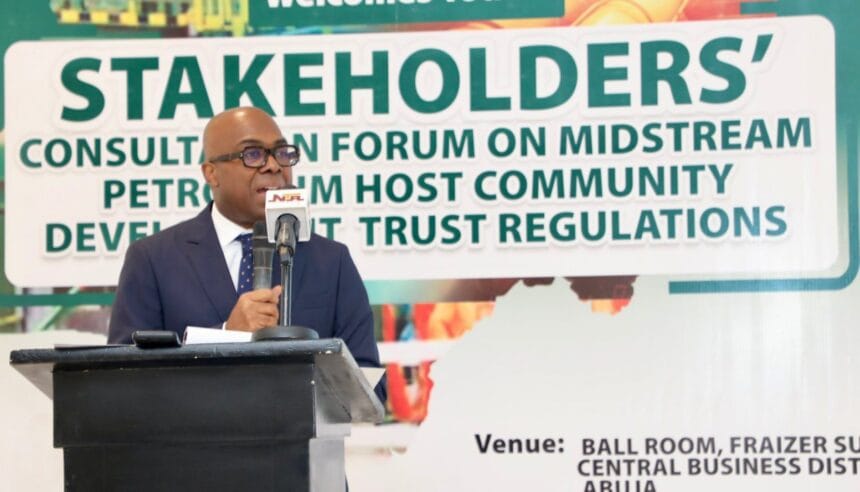… enhance co-existence between licensees, lessees, and host communities
… Authority reveals plans to upgrade Dangote Refinery pre-commissioning license to fully operational status
Oredola Adeola
The Nigerian Midstream and Downstream Petroleum Regulatory Authority (NMDPRA) has commenced the stakeholders’ review of the draft regulations for the implementation, establishment, and administration of the Midstream Host Community Development Trust (MPHCDT).
The review is dedicated to enhancing the peaceful and harmonious co-existence between licensees, lessees, and host communities, as well as to curtail pipeline vandalism and increase crude oil and gas production.
The Authority has also disclosed the plans to upgrade the pre-commissioning license of the Dangote Petroleum Refinery to a fully operational license.
Engr. Farouk Ahmed, Chief Executive, NMDPRA, made this known on Tuesday at the stakeholders’ forum on MPHCDT held in Abuja.
The Authority CE who was represented by Mr. Ogbugo Ukoha, Executive Director, Distribution Systems, Storage and Retailing Infrastructure, NMDPRA, in his remark revealed that the stakeholders’ Forum was an attempt to provide a platform for harnessing ideas for the HCDT implementation.
He said, “The regulation shall apply only to Midstream Petroleum Hosts Communities and a holder of a license that is engaged in the midstream petroleum operations in accordance with Section 318 of the Petroleum Industry Act (PIA).
Dr. Joseph Tolorunse, Authority Secretary and Legal Adviser, said the NMDPRA may by notice designate the facilities to which these regulations shall apply in accordance with the PIA.
He listed the objectives of the regulations to include the procedure for the establishment and administration of the Trust Fund for the midstream petroleum host communities and to establish parameters to safeguard the Trust Fund.
According to him, the regulations would also establish grievance resolution mechanisms for the settlement of disputes between the host communities and licensees.
“The regulations will make general rules for the implementation of the development of the midstream petroleum host communities. It is expected to promote social and economic benefits from petroleum operations to the host communities.
Dounamene Dekor, House Committee Chairman on Host Communities, in his remark, said that the committee had carried out a series of engagements to understand the current status of implementation of benefits to the host communities.
He therefore charged the NMDPRA to expedite actions to apply proactive and innovative mechanisms that would ensure the speedy and effective operationalization of the funding of host communities in the sector.
House Committee Chairman on Host Communities therefore noted that the Committee has identified some of the challenges that the NMDPRA faces in the implementation of the PIA, particularly the omission of the mainstream petroleum operation in Section 240-2 that provides for the funding of the HCPs.
He said, “Our Committee is ready and already talking about necessary legislative actions and steps to address these gaps and challenges.”
Aderemi Ogunbanjo, Partner in charge of the firm’s Energy and Natural Resources (ENR) Practice Group, in her submissions made a proposal for the restriction of the Authority’s powers to ensure the incorporation of the HCDT exclusively to upstream operators and operators of designated facilities in Midstream Petroleum operations, aligns with Section 236 of the Petroleum Industry Act (PIA) 2021.
She also suggested the need for clarity on the criteria for disqualifying a Trustee of the Midstream HCDT and also called for the establishment of a timeframe for the approval of amended HCDP, with provisions for ‘deemed approval’ should the Authority exceed the stipulated time frame.
Meanwhile, the NMDPRA also explains measures being put in place to upgrade Dangote Refinery’s license and explains some of the progress made to streamline and regulate the downstream petroleum sector, paving the way for increased efficiency and growth in the industry.
According to the Authority CE, only three refineries in Nigeria has valid licenses, while approximately 15 gas processing facilities across the country have valid licenses, with more in the pipeline.
Additionally, the Authority revealed that 1,199 downstream facilities have valid licenses, and more than 176 businesses hold gas import permits.
Furthermore, Engr. Ahmed stated that 130 petroleum product depots have valid licenses, and 69 have valid coastal vessel permits.
He also emphasised that the Authority has also licensed 9,464 retail outlets as of April 30, 2024.




